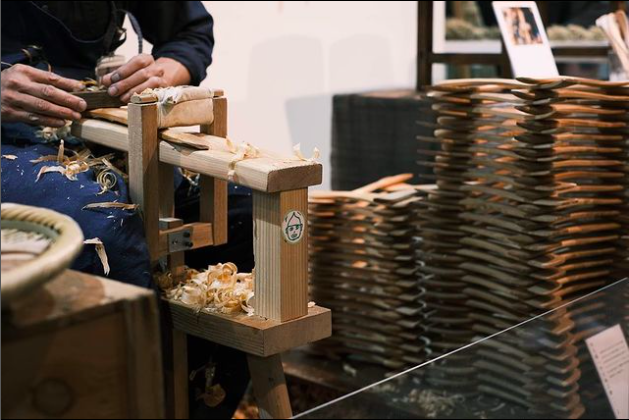Kotaro Okubo-Japanese Spoon Carver
This summer we will host a class at our school with one of Japan’s best spoon carvers, Kotaro Okubo. If you are interested in Japanese woodworking, craft, or making ethos, this will be something you won’t want to miss. It will be great.
A few of Kotaro’s elegant spatula’s
Jazmin and I learned about Kotaro from our friend Masashi Kutsuwa on our first visit to Japan back in 2018. We weren’t able to meet him then, but I have been following his work on Instagram. His designs and process/approach to carving is fascinating. One unique thing about Kotaro’s work is his use of wooden bodied spokeshaves called nankin-kanna to carve highly elegant spoons and spatulas
I first learned about these tools when we visited chair maker Toshio Tokunaga in 2019. Tokunaga uses nankin-kanna (not sandpaper) to effortlessly smooth the complex curves of all his chairs to a completely hand planed finish. When Tokunaga demonstrated how they worked, grain direction didn’t seem to matter and the fine shavings he created floated in the air after each cut. He explained that the wooden bodies and the razor sharp blades of nankin-kanna both could be customized to cut a wide variety of shapes and blend with the user’s working style and the objects they make. To be honest, as a non-chairmaker I didn’t see their potential in my own work. That all changed when I saw Kotaro using them to make spoons and spatulas.
To say Kotaro is prolific is an understatement. He carves over 7,000 utensils every year! He uses dry wood, band sawed to shape and then soaked in water to make it supple. Then shapes them further with his spokeshaves and shave horse. He explained that he came across this unique tool ten years ago and was fascinated by its possibility. The beautiful curves and facets of his spoons and spatulas are all achieved by these nankin-kanna. Here’s a great short video of him working.
For years I’ve been searching and exploring different ways to increase my own productivity and still keep the mark of the hand on my work. This search has lead me down roads I couldn’t have predicted and has caused me to question (and abandon) some of my earlier held beliefs about what is hand made and what is not.
Kotatro at work in his Nagano workshop
Some of you may remember my rediscovery of the Swedish ‘sked marr’—renamed the ‘spoon mule’ as part of that search. Here’s a past post on it. Here are a few videos from back then in 2014 after building my first one. The first video shows the basic concept and design , the second was showing the skavare or skorp I used to hollow with the mule. And in my spoon carving video —the mule starts at about 1:51. That video has 230,000 views. Wow!
Back then I was looking for easier ways to carve spoons and exploring work holding devices that allow the use of a drawknife along the whole length of the spoon—that was paramount. I still use the spoon mule and most of the same techniques today when I make small batches of spoons. But my preferred designs still require me to finish them in my hand with a sloyd and hook knife.
Our friend Masashi with the axe he developed.
All this to say that Kotaro’s approach is of great interest to me because it ties into my search and exploration into craft production methods. I want to add improvements to my process and to make things easy on my body—while maintaining a certain quality of design and workmanship. Plus I try to keep my prices within a certain range. So….7,000 spoons gets my attention.
This will be the first time Kotaro will teach outside Japan. It’s going to be such a great opportunity to learn from Kotaro and also Masashi (who is a powerhouse of knowledge about Japanese crafts, a skilled woodworker and teacher who works at Gifu Forest Academy).
This is a rare chance for folks here in the States—and for some a once in a lifetime opportunity. I’m really looking forward to it. There are just a few open spots left in this class, so if you’re on the fence they won’t last much longer.
Some of Kotaro’s spoons.




